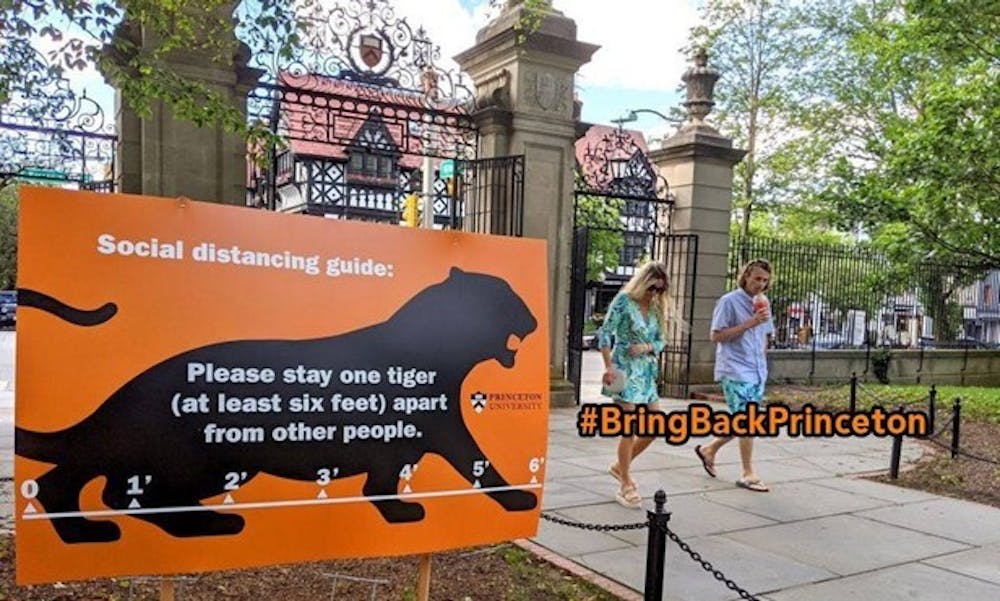With plans for the spring semester expected in the first week of December, over 250 parents of University students are petitioning Nassau Hall to invite the entire student body back to campus.
Created four days before University President Christopher Eisgruber ’83 sent a mid-semester update on Monday, the 523-member Facebook group “Bring Back Princeton” describes itself as a “private group of parents, students and advocates for the reopening of Princeton University.”
The group’s open letter to Eisgruber, Dean of the College Jill Dolan, and Vice President for Campus Life Rochelle Calhoun had garnered 283 signatories at the time of publication.
The open letter cited a widespread decline in students’ mental health and the diminished quality of online learning as reasons for students to return to campus. According to the signatories, students have reported “being anxious, depressed, and too stressed and exhausted by Zoom to make any connections online.”
“We fear for the mental, physical and psychological wellbeing of our students,” they wrote. “The all online model is not sustainable for another semester.”
When asked to respond to the letter, Deputy University Spokesperson Michael Hotchkiss wrote, “We appreciate engagement on these important issues from all members of the University community,” and emphasized Eisgruber’s Monday community message.
To parents such as Isabella Sledge, a public health practitioner, physician, and member of the Facebook group, a hybrid model that combines in-person and Zoom classes would be preferable to existing conditions. Sledge said she feels students are missing group discussion in their online classes.
Sledge asserted that some universities that opened have fared well.

“The schools that are doing the aggressive surveillance testing and having students sign the social contract … nip clusters in the bud,” she said.
In his update, Eisgruber wrote that the University is “preparing for the possibility that we will be able to welcome back significantly more undergraduate students in the spring.” He noted that the University community has remained healthy this semester, with only 23 of the over 30,000 COVID-19 tests administered by the University returning positive results.
“These results are consistent with reports from many other American campuses with extensive asymptomatic testing protocols,” he added. “On campuses that have instituted and followed responsible public health guidance accompanied by extensive testing, there is as yet no evidence that the virus is spreading in instructional settings or in dormitory housing.”
Eisgruber’s message also informed the community of a new on-campus testing laboratory set to open in November, which will provide results within 24 hours. In addition to these efforts, Eisgruber wrote that the University is in active discussion with leaders of other campuses and a range of public health experts to understand what approaches have been met with success, which have not, and how to apply such lessons at the University.

In the open letter, Sledge and other parents who work at or have children enrolled at universities operating in-person this fall cited Yale, Duke, and Notre Dame’s COVID-19 response plans, suggesting the University could seek to replicate them.
Karen Flyer, a Duke alumna with a daughter enrolled at Duke and a son in the Class of 2024, is an administrator of the Facebook group. Flyer said that Duke — which has a 0.12 percent positivity rate — worked hard to successfully bring back students.
“[Duke] went to great lengths to bring all students back, including renting hotels and apartment complexes in order to de-densify the campus,” she said.
Flyer’s son, Daniel Flyer ’24, agreed that the University should open for in-person classes in the spring.
“Personally, I feel disconnected from other Princeton students and unable to reach out to others apart from the occasional message in chats to check answers,” he said. “Asynchronous classes don’t feel like a class … more like studying on your own. I really prefer the in-person or the live as opposed to clicking through the modules on Canvas.”
Though Eisgruber noted that “early fall has gone well on this campus and for many of our peers,” the University does not expect to announce spring plans prior to December. He added, “the next six weeks will provide additional, and crucial, information” with cold temperatures forcing people indoors and the flu season beginning.
“I recognize that the continued uncertainty is unwelcome, and I wish it were possible to make an earlier announcement,” he wrote. “We have to contend, however, with factors beyond our control.”
Even with their concerns for students, parents in the Bring Back Princeton group conceded external difficulties, such as the onset of winter weather, that could adversely affect ambitious reopening plans. Sledge suggested the University begin and end the semester later.
The open letter also provides examples of methods that could mitigate the spread of COVID-19 on campus, including “overhauling ventilation systems, setting up tents for outdoor learning, and offering a full summer semester.”
The parents see now as “the time to enact out of the box solutions” to allow students to return.
“We believe wholeheartedly in the ability of Princeton to think strategically and creatively in this extremely challenging circumstance, and trust that it can find a way to bring its students back,” their letter concludes.








